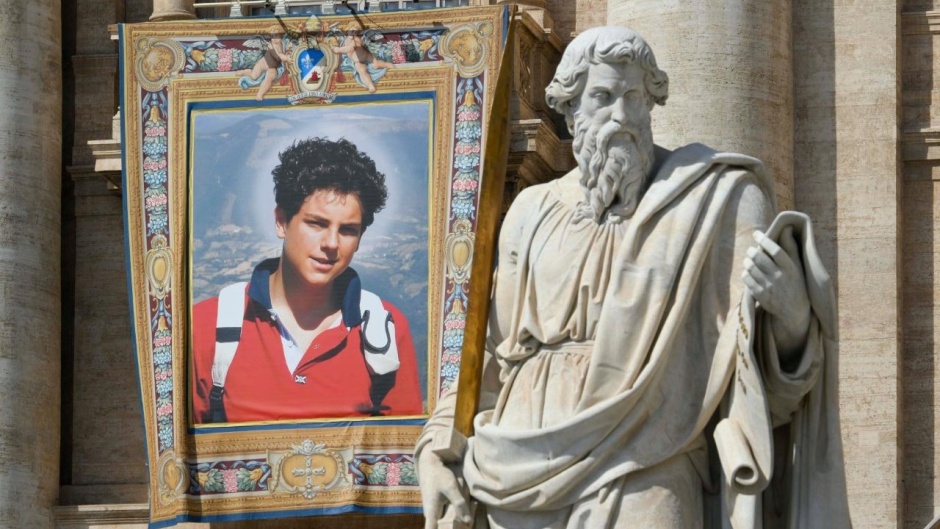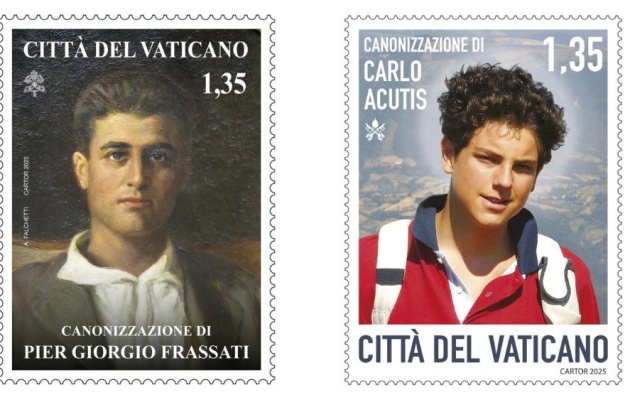In his first canonisation, Pope Leo XIV makes a millennial 'influencer' devoted to spreading the word about miracles and Marian apparitions a saint. Catholicism expert Leonardo De Chirico explains the context.
 The portrait of Carlo Acutis, displayed in St. Peter's Square in the Vatican on the day of his canonisation. / Photo: Vatican Media.
The portrait of Carlo Acutis, displayed in St. Peter's Square in the Vatican on the day of his canonisation. / Photo: Vatican Media.
In front of 70,000 people in St. Peter's Square at the Vatican, Pope Leo XIV officially recognised the first two saints of his pontificate.
One of them, Carlos Acutis, is already a star in today's Roman Catholicism. There are prayer cards, T-shirts, merchandise and souvenirs with his photo on them.
Acutis, who died of leukaemia in 2006 at the age of 15, is the first millennial to be declared a “saint” by the Catholic Church. The other person canonised by the Pope on 7 September was Pier Giorgio Frassati, another young man who died in 1925.
“We enrol them among the saints, decreeing them to be venerated as saints by the whole Church”, said Pope Leo XIV to the crowd.
As usual, the Vatican media broadcast the event live, and millions shared messages on social media about the new saints.
Evangelical Focus asked Leonardo De Chirico, a theologian and evangelical pastor in Rome (Italy), about the purpose of this latest canonisation.
Question. How do you interpret the fact that a millennial who died at the age of 15 is one of the first two saints declared by Leo XIV?
Answer. The canonisation process began long before Pope Leo XIV. It was scheduled to be celebrated during the 2025 Jubilee year that was proclaimed by Pope Francis. So, Pope Leo found it on his desk, so to speak. But from his homily one can appreciate how deep affection and admiration he has for Carlo Acutis.
It is obvious that the Catholic Church is looking for role models to be presented to youth as exemplars. Moreover, when one is proclaimed as a “saint” that means that people can pray to him asking for his intercession. The canonisation process is embedded in the Catholic view whereby we can pray to the “saint” instead of approaching the Father in the name of Jesus Christ, the only Mediator.

[photo_footer]Commemorative stamps issued by the Vatican of the two new saints, Pier Giorgio Frassati and Carlo Acutis. [/photo_footer] Q. Carlo Acutis is known for the website he created to ‘document’ miracles and apparitions of the Virgin Mary around the world. He was nicknamed “God's influencer”. How would you describe his influence?
A. One has to try to enter the Roman Catholic universe that is made of devotional imaginery and practices. Mariology is steeped in the heart of Roman Catholicism. It sparks deep emotions and visions.
As far as we know Carlo Acutis had little Bible knowledge and yet he had an already inflated Marian spirituality. His life was at home in the ‘Marianised’ world of Catholic devotions. Being a young man, he tried to digitalise his accessibility. I don’t know how biblically sustainable is to call him “God’s influencer” when his young life was so immersed in Mariological horizons.
Q. The Pope spoke at the Vatican yesterday before 70,000 people, including the President of Italy, Mattarella, during the canonisation ceremony. There are already all kinds of images and sacramental symbols surrounding saint Carlo. Are there Catholics who see this type of canonisation as bizarre and contrary to the Bible? Or is it seen as positive by the majority of Roman Catholics in Italy and around the world?
A. As far as I can tell, both Acutis and Frassati have received good press. No critical remarks have emerged so far. People, even the secular public, are impressed by the young age and the “miracolous” narrative that was created around them.
With the worrying narcisist and nihilist trends in secularized youth culture, they are seen as “positive” young people, having “good” passions. This is the humanistic side of the canonisation that even secular people tend to appreciate.
The religious side of it is that Acutis and Frassati are now officially recognized as recipients of petitions and intercessions of the faithful. Prayers to them and votive masses will be encouraged in Roman Catholic practice and piety.
Then crowds will pay homage to their burial places in a visual expression of communion between the living and the dead. This is hardly a biblical practice to be encouraged. With the canonisation of Acutis and Frassati, the Roman Catholic church has scored a win-win point: the secular audience is looking at the youthful passions of these young men as a positive factor, the religious people will pray to them to receive graces and help. But where is the gospel of Jesus Christ in all this?
[analysis]
[title]Join us to make EF sustainable[/title]
[photo][/photo]
[text]At Evangelical Focus, we have a sustainability challenge ahead. We invite you to join those across Europe and beyond who are committed with our mission. Together, we will ensure the continuity of Evangelical Focus and our Spanish partner Protestante Digital in 2025.
Learn all about our #TogetherInThisMission initiative here (English).
[/text][/analysis]

Las opiniones vertidas por nuestros colaboradores se realizan a nivel personal, pudiendo coincidir o no con la postura de la dirección de Protestante Digital.
Si quieres comentar o